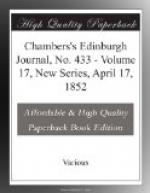Title: Chambers’s Edinburgh Journal, No. 433 Volume 17, New Series, April 17, 1852
Author: Various
Editor: Robert Chambers and William Chambers
Release Date: May 12, 2006 [EBook #18382]
Language: English
Character set encoding: ASCII
*** Start of this project gutenberg EBOOK Chambers’s Edinburgh ***
Produced by Malcolm Farmer, Richard J. Shiffer and
the
Online Distributed Proofreading Team at http://www.pgdp.net.
Chambers’Edinburgh journal
Conducted by William
and Robert Chambers, editors of
’Chambers’s
information for the people,’
‘Chambers’s educational course,’
&c.
No. 433. New series. Saturday, April 17, 1852. Price 1-1/2_d._
THE DINGY HOUSE.
London is like a large company, where it is necessary for the master or mistress of the house to introduce a great many people to each other. Everybody in that overgrown metropolis has things within a few doors of his residence, which, if they were suddenly described to him, he would hear of with deep interest or extreme astonishment. There is a plain back street near the Haymarket, bearing the title of Great Windmill Street, in which there is a large, dingy-looking house standing somewhat detached, and not appearing to be in the hands of ordinary tenants. Very near this, is a distinguished haunt of gaiety, very well whitened, and looking very smart, but which would be no index to the character or purposes of the dingy mansion. A group of dirty children will be found disporting at marbles or pitch-and-toss on the paved recess in front; but neither would that scene be found in any kind of harmony with the house itself. It is evidently a house with a mystery.
Very few people would be found in the course of a day to pass out of or into that house. A blind would seldom be raised. A fashionable carriage would not once in a twelvemonth be seen rolling up to the gloomy portals. Supposing, however, that any one were to be so curious as to watch the house for an afternoon, he would probably see two women in extraordinary dresses come up to the door, apparently laden with some heavy packages, shrouded under their wide black cloaks. He would see the door opened with some caution, and the two women would then walk in, and be seen no more for that day. He might speculate for hours about the business in which these women had been engaged, but in vain. He might make inquiries in the neighbourhood, but probably with as little result; for, in London, it must be an extraordinary family indeed which provokes any inquiry among neighbours, and most undoubtedly the inmates of the mansion would never think of proclaiming what they were, or how they lived.




